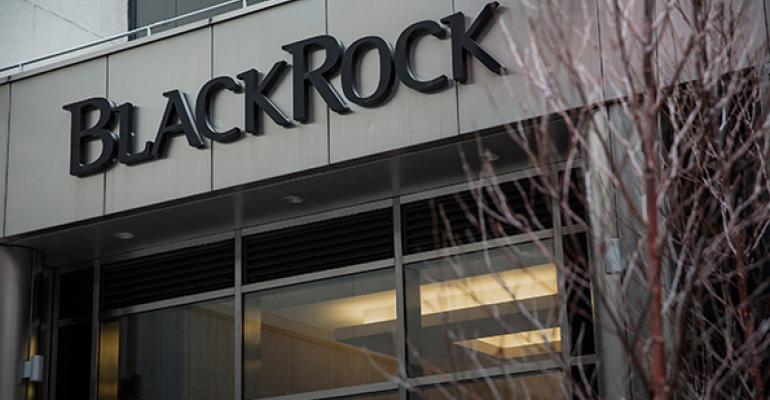(Bloomberg) -- Large municipal-bond funds run by BlackRock Inc., Nuveen, Pacific Investment Management Co. and Invesco Ltd. are unwinding a leveraged investment strategy that backfired this month, contributing to the flood of debt that’s been unloaded during a record-setting sell-off.
Last week, fund companies began liquidating about 75 so-called tender-option bond trusts holding $1.2 billion worth of state and local government debt, according to data compiled by Bloomberg. The trusts issue floating-rate notes to money-market funds and use the cash to buy higher-yielding long-term bonds. Mutual funds seek to pocket the difference in yield between the two.
But the strategy is backfiring because yields on short-term debt have skyrocketed as investors pull cash out of money-market funds and banks struggle to resell the notes. A weekly index of tax-exempt debt with variable interest rates spiked to 5.2% on Wednesday, the most since 2008 and almost 2 percentage points more than yields on 30-year top-rated municipal debt.
To pay off short-term notes, mutual funds are selling municipal bonds held in the trusts as collateral. That has been putting more pressure on the market, which this month has suffered its biggest losses in at least four decades amid concern about the economic and financial fallout from the coronavirus.
“There comes a point where the rate gets too high and there’s no money left for the investor,” said Chad Farrington, a managing director at DWS Investment Management. “If funding costs get to certain level you must reduce the leverage.”
On Monday, in an effort to relieve funding pressure in the muni market, the Federal Reserve agreed to purchase short-term securities from tax-exempt money market funds, including the variable rate demand obligations that make up almost 75% of short-term tax-exempt bonds, according to Citigroup Inc. While that appears to have eased some of the liquidity strains, with prices broadly unchanged Monday, short-term yields haven’t come down.
The jump in short-term rates came as investors pulled $5.3 billion out of tax-exempt money-market funds the week ending March 18, according to the Investment Company Institute. That pullback caused dealer inventory of variable demand notes to swell to $5.7 billion on March 11, a 80% increase in two weeks, according to the Federal Reserve Bank of New York. The funds sold them back to banks that act as remarketing agents and liquidity facilities. When fresh data comes in this week, the inventory will likely be much higher.
The leverage employed by mutual fund companies has amplified losses in the closed- and open-end funds as rates climbed during the sell-off.
As of Friday, returns on 15 BlackRock closed-end muni funds that use tender-option bonds and preferred shares as leverage have dropped more than 20% this month and one, the BlackRock Maryland Municipal Bond Trust, has lost 30%, according to data compiled by Bloomberg. Five of Nuveen’s closed-end funds have lost more than 20% and one has lost 30.5%. Nuveen’s open-end High Yield Municipal Bond Fund, which also employs tender-option bonds, has dropped 21.7% this month.
Invesco and Pimco’s muni closed-end fund share prices declined 15% to 25% this month.
Those drops are far bigger than the overall municipal market’s. The Bloomberg Barclays index of investment grade munis has declined 10.3% this month, the biggest drop since at least 1980, and high-yield municipal bonds have fallen 19.1%.
Spokespeople at BlackRock, Invesco and Pimco declined to comment. A spokesperson from Nuveen didn’t immediately return phone and email messages requesting comment.
The tender-option bond market is about $50 billion, less than a quarter its size before the 2008-2009 financial crisis, when hedge funds that used the securities were forced into fire sales. At the time, investors shunned the debt because it was guaranteed by bonds insurers like MBIA Inc. and Ambac Financial Group Inc., which were stripped of their AAA ratings because of losses tied to toxic mortgages.
The tender-option bond programs work like this: A fund deposits highly-rated bonds in a trust, which then issues two securities -- a floating-rate bond backed by a bank that is typically sold to a money market fund and another security, known as an “inverse floater,” retained by the mutual fund. The fund receives the “residual” income of the underlying bonds in the trust after paying interest on the floating-rate bonds and trust administration fees.
As short-term interest rates rise, the inverse floater produces less income and in extreme cases may pay none. The mutual fund has the ability to unwind the trust by paying off the short-term bonds and turning over the residual. The long-term bonds that were placed in the trust may be used to pay-off the floating-rate notes, which could push market prices down further.
--With assistance from Matthew Himel and Natalia Lenkiewicz.
To contact the reporter on this story:
Martin Z. Braun in New York at [email protected]
To contact the editors responsible for this story:
Elizabeth Campbell at [email protected]
William Selway






